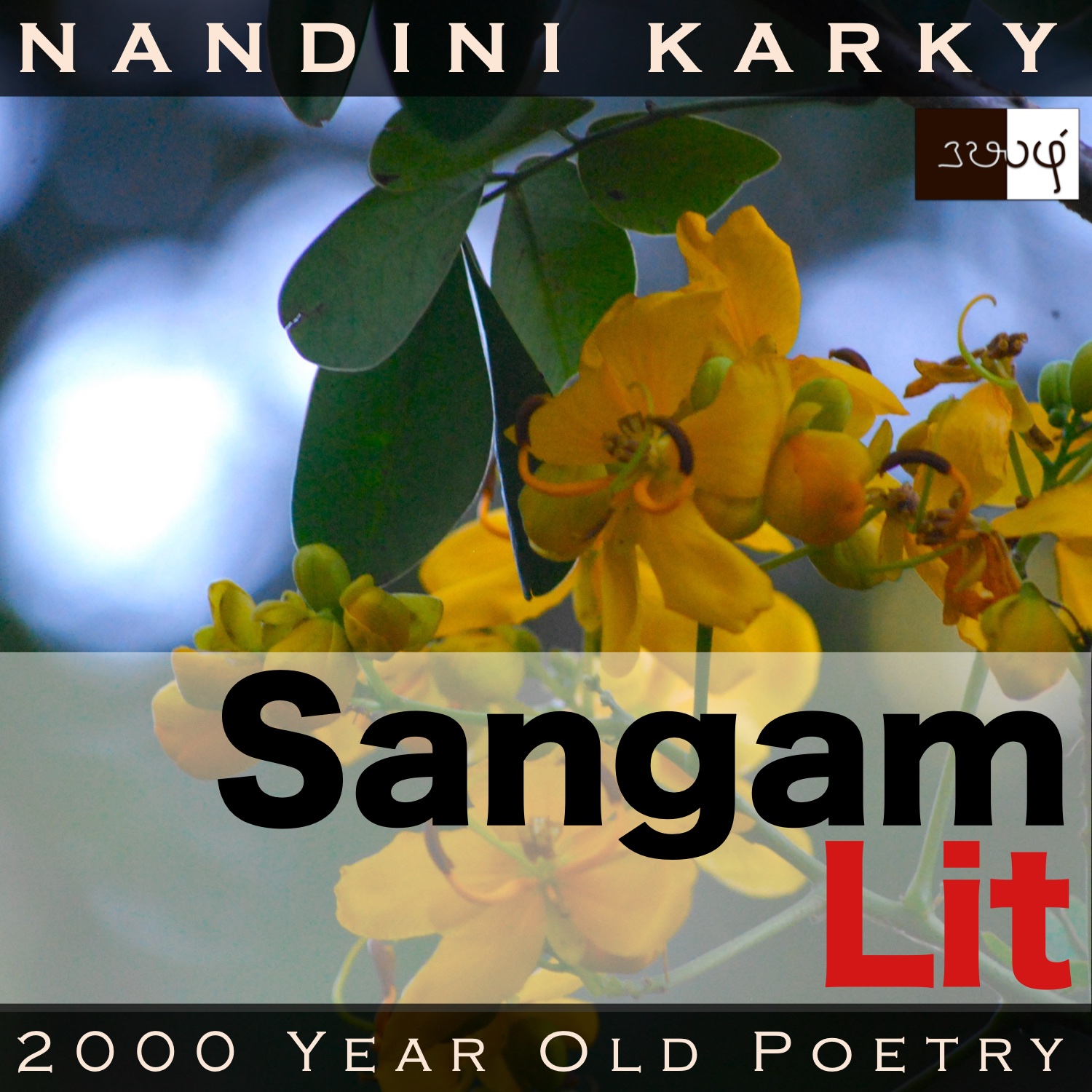Podcast: Play in new window | Download
Subscribe: Apple Podcasts | Spotify | Amazon Music | Android | iHeartRadio | TuneIn | RSS | More

In this episode, we take in the lush scenes of Tamil Sangam Literary work, Natrinai Poem 13, written by the proficient Kabilar. This verse is set in the landscape of ‘Kurinji’ or the mountainous region, in the words of the lady’s confidante to the lady, portraying a subtle understanding of the lady’s situation.
எழாஅ யாகலின், எழில் நலம் தொலைய
அழாஅ தீமோ, நொதுமலர் தலையே!-
ஏனல் காவலர் மா வீழ்த்துப் பறித்த
பகழி அன்ன சேயரி மழைக் கண்,
நல்ல பெருந் தோளோயே! கொல்லன்
எறி பொன் பிதிரின் சிறு பல் காய
வேங்கை வீ உகும் ஓங்கு மலைக் கட்சி
மயில் அறிபு அறியாமன்னோ;
பயில் குரல் கவரும் பைம் புறக் கிளியே.
The verse starts with the mellifluous sounds of ‘எழா’ and ‘அழா’, like how a breeze, would talk to the leaves of the mountain trees. We encounter the cool, moist eyes of the Kurinji woman in ‘மழைக் கண்’. The phrase ‘கொல்லன் எறி பொன் பிதிரின்’ makes golden sparks scatter before one’s eyes. Whenever we encounter two associated words, we tend to assume it would mean just one thing. For instance, in the encounter of the word ‘குரல்’, whose well-known meaning is ‘voice’, in close proximity with ‘கிளி’, meaning a ‘parrot’, we would most certainly assume that this line is saying something about the ‘voice of the parrot’. However, I learnt a new meaning for the word ‘குரல்’ meaning the spiky ‘ears of the millet’, serving to portray the food for the parrot rather than the food for our ears in its voice.
Hearing the mountain song a little more clearly, I was able to understand the context and meaning as follows: The lady is trying to hide the secret of her union with her man. But the lady’s friend seems to understand her state and throws subtle hints about this by saying, ‘Dear girl, I see that you have not risen up. At least, do not shed tears, because you are away from home and in the place of strangers. I say so, because your cool and moist eyes are streaked with red lines like the blood stained arrows pulled out of the bodies of beasts that dare to broach millet fields, guarded by those marksmen. O wide shouldered woman! Like the golden sparks that fly off a goldsmith’s forge, the flowers of the Vengai or the Indian kino tree, lie scattered. In this mountainous landscape, unaware that peafowls are watching them, those green hued parrots are stealing away the ears of the millet crop. Do rise and chase away the parrots!’
Is a song just about the words or the rhythm? Or is it something more? When you come away, what do you take with you? Is there time in this age to slowly savour something and let it tell what it will tell you? If we take the time, what images and what thoughts can we unearth from the things we see and hear? In this verse, I was left with that image of sparks flying off a goldsmith’s forge, scattering all around. I was fascinated to see the flight of fire linked to the fall of flowers. This ancient tree, referred in the simile, is the Vengai tree, the Indian Kino, which is being reared and protected even today for its therapeutic benefits in the cure of diabetes. Those little flowers that bloom on the tree, stay not there, but are scattered away, to spread life. It is but natural, the lady’s confidante, says in a subtle hint. There is the scene of farming mountain folk, guarding their crops from beasts on the ground and birds that fly above. They seem to have placed marksmen to raid the roving beasts as we learn from the reference to red stained arrows drawn out, and young girls seem to be entrusted with the task of chasing away parrots that come to steal the ears of crops. There is a strong sense of something being protected and yet, being stolen away, in this verse.
Finally, the call of the confidante to the lady, to focus on the task at hand, no matter the thoughts that run through one’s mind, seems to be a wake-up call for all of us. In a time when so many things distract and call our attention, perhaps we all need a voice like that of that lady’s confidante, to say, ‘Turn away from the pulls of the past and just do what you have to do!’




Share your thoughts...